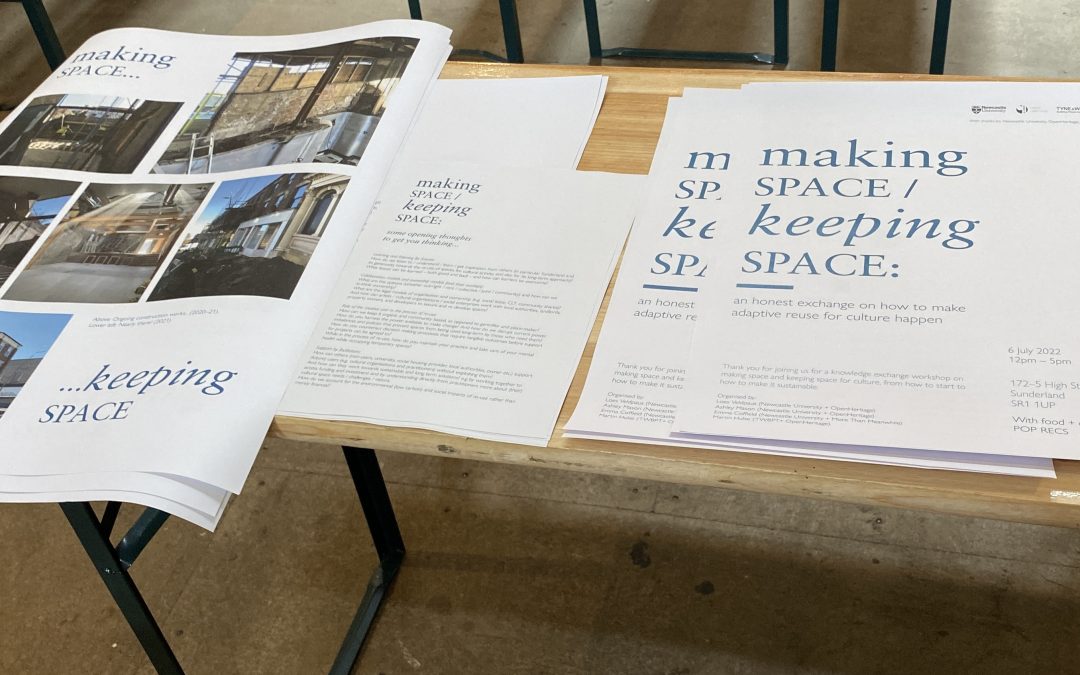In July 2022 the national workshop was held at Pop Recs. Called ‘Making Space / Keeping Space: An Honest Exchange on How to Make Adaptive Reuse for Culture Happen’, the afternoon was attended by 40 guests, ranging from policy makers to creatives to cultural organisations and facilitators.
The event was co-organised with Emma Coffield of More Than Meanwhile Spaces.
The event was a knowledge exchange workshop on the challenges and fears, the difficulties and impediments, the learnings and excitement, of making space and keeping space for culture: how do you start? What are the mechanisms? How do you reach the right people? What works and doesn’t work? How do you create or facilitate sustainability and stability in the long term? With shrinking possibilities, increased precarity and deleted possible futures many creatives are worn down and cannot afford to take risks; on the afternoon of Wednesday 6 July, we provided a safe space to ask, to speak, to wonder, to rant, and have honest and open conversations on what’s still missing and what we could learn from recent projects within Sunderland.
The workshop was a non-recorded, intimate, invite only, in person event, with three facilitated panels tied to the process of making adaptive reuse for culture happen, from how to start to how to make it sustainable. The middle panel was a moving tour taking in the experiences of the adaptive heritage reuse of 170–177 High Street West, Sunderland by the Tyne and Wear Building Preservation Trust (TWBPT) and Reading Room at The Athenaeum.

Main topics and discussion points included:
Learning and listening for futures: How do we listen to / understand / learn / get inspiration from others (in particular Sunderland and its generosity towards the re-use of spaces for cultural activity, and also for its long-term approach)? What lesson can be learned – both good and bad! – and how can barriers be overcome?
Collaboration models and ownership models (and their overlaps): What are the options (whether out-right / rent / collective / joint / community) and how can we re-think ownership? What are the legal models of organisation and ownership (e.g. social lease, CLT, community shares)? And how can artists / cultural organisations / social enterprises work with local authorities, landlords, property owners, and developers to secure and re-develop spaces?
Role of the creative user in the process of re-use: How can we keep it organic and community based, as opposed to gentrifier and place-maker? How do you harness the power available to make change? And how do we disrupt current power imbalances and policies that prevent spaces from being used long-term by those who need them? How do you counteract decision making processes that require tangible outcomes before support for projects can be agreed to?
While in the process of re-use, how do you maintain your practice and take care of your mental health while occupying temporary spaces?
Support by facilitators: How can others (non-users, university, social housing provider, local authorities, owner etc.) support (future) users (e.g. cultural organisations and practitioners) without exploiting them? And how can they work towards sustainable and long-term solutions? e.g by working together to access funding and investment and by understanding directly from practitioners more about (their) cultural space needs / challenges / visions. How do we account for the environmental (low carbon) and social impacts of re-use rather than merely financial?
How do we connect, collaborate, learn, and listen with others? How do we disrupt and counteract power imbalances, policies, and decisions making processes? How can we support adaptive reuse for culture towards sustainability?
A reflection on the event by attendee Kitty McKay can be found here:

